How we can reinforce the European Youth Employment Policy through the European Green Deal after the COVID-19 crisis? A proposal submitted to the European Commission by World Future Council, the partners of the EUKI_YESclima project (between them WindofRenewal/AnemosAnaneosis and the BMBF funded project GRÆDUCATION (between others F.I.A.P.)
Memorandum submitted to the European Commission by World Future Council, the project YESclima in the European Climate Initiative “EUKI” and the BMBF funded project GRÆDUCATION
The following proposal refers to the outstanding tasks of the member states to elaborate programmes on how to apply the European Youth Guarantee and the finances provided for this in their countries. It aims to relate the programme to green recovery policies and the challenges of climate protection in Europe in the next years.
-
Introductory remarks
The signatories strongly welcome the European Commission’s initiative to “reinforce the Youth Guarantee” as part of the Commission Work Programme for 2020, and to reshape this instrument to support young people in gaining work experience and developing skills which are specifically relevant both for a green and digital transition, as well as to boost employability in the green economy. There is no doubt that the unforeseen COVID-19 crisis, which has had a firm grip on the world since the beginning of 2020, will plunge it into a deep recession. It is feared that unemployment will rise massively in all affected regions of Europe. Given the already high unemployment rate among young women and men in Europe and as a consequence of the economic depression by and after the COVID-19 crisis, the exclusion of (not only!) the European youth from economic activities will increase.
The youth labour market is highly sensitive to economic cycles and in times of economic crises, youth employment is hit more strongly by economic shocks than adult employment. Young workers are often “first out”. According to the OECD, “almost 1 in 10 jobs held by workers under 30 were destroyed during the [2008] crisis. In Spain, Greece and Ireland, the number of employed youth halved between 2007 and 2014”.4 A decade later, youth employment has still not recovered to pre-2008 crisis levels.5 Southern and Eastern European countries are most impacted by youth unemployment,6 and the COVID-19 crisis is likely to critically exacerbate this situation in these regions. We would also like to highlight that in economic crises, young women in particular are more often excluded from the labour market and from economic activities.
The present situation offers a unique chance for all EU countries to reshape the economic recovery after the COVID-19 crisis into a green recovery, by implementing the goals set out in the European Green Deal (EGD) and the National Energy and Climate Plans (NECPs), according to the EU Regulation 1999/2018. The EU has set an ambitious goal for 2050: to reach net-zero greenhouse gas emissions. Unfortunately, we are still far from achieving this objective, which makes it more necessary than ever to redouble the efforts of member states to work in this direction. Society will have to significantly reduce current levels of energy consumption without giving up living standards. At the same time, that energy must be produced mainly by renewable sources. Europe, being a continent with a large coastline, will have to start exploiting clean marine energy to a greater extent. This will create new business and service opportunities for which today’s youth will need to be prepared. To realise these aims, a well-equipped, creative young workforce is desperately needed.
In our opinion, youth employment policies generally, and the European Youth Guarantee in particular, should be geared towards increasingly preparing young people specifically for tasks and professions that are important, indeed indispensable, for the sustainable and environmentally compatible future of business and society. Therefore, support should not only be provided to accommodate young people in existing work contexts. Instead, the focus should be on employment in innovative, emerging professions that are important for a sustainable Europe and in creating jobs with a focus on “Green Skills”. Activities that aid decarbonisation and quickly achieve climate neutrality are central to this. Yet in most European countries, the existing training and other measures do not cover the demand of “Green Skills” and the needs of modern labour markets. Jobs and services related to renewable energies, circular economy and sustainable development have to be created and existing professional profiles have to be redefined.
-
Reinforcing the Youth Guarantee
As civil society organisations working in the field of youth employment, sustainability, and good policies, we would like to structure our ideas in 5 blocks relating to issues raised by the European Commission to discuss a redesign of the European Youth Guarantee with civil society.
-
What are the most significant challenges for young people in their first transitions to the labour market and in which areas could the Youth Guarantee be reinforced?
Generally, we concur with the analysis by the European Commission, but we stress the importance of linking the problem of youth unemployment to the current devastating situation caused by the pandemic, as a consequence of which youth unemployment will skyrocket. Given the upcoming recession, we call on the European Commission and EU-countries to urge the implementation of national Youth Guarantee Implementation Plans and to adapt them to the current situation.
-
How could the Youth Guarantee better support employability of young people in vulnerable situations, including those living in rural / remote areas?
Besides improving the educational path to afford every young person access to decent and green jobs, no matter his or her background, we also strongly believe that vocational training provides for better employability. To improve vocational education the following conditions are required:
-
Vocational preparation should already be closely linked to professional practise to raise awareness for the needs and opportunities of labour markets.
-
A large majority of young people with fewer qualifications are less equipped in mathematics, digital technologies and in their capacity to deal with texts. Thus, basic skills in these areas should be imparted into the educational background, to empower young people in the use of innovative, green technologies.
-
Enhancing soft skills should already be a crucial part during vocational preparation in order to create the foundation needed for vocational training. Skills that can be summarised under the term entrepreneurial skills should also be considered.7
-
Vocational preparation is an excellent method to raise awareness and build motivation towards gaining the necessary green skills the green labour market needs.
-
The vocational preparation phase should be limited to a clear time frame.
Given these conditions and considering the European Green Deal (EGD), we believe that the following fields of activities will be increasingly in demand in the coming years. Targeted professional preparation within the framework of the European Youth Guarantee or other programmes such as the “NEW Skills Agenda” support this development.
-
EGD 2.1.2: focuses, among other things, on combating energy poverty. To specifically address households suffering from energy poverty, we suggest that young people from the same social milieu should be qualified and engaged as communal energy consultants. Their work would focus on energy and cost savings in everyday life and provide contacts to public offers (such as microcredit and grants for devices for energy generation and use). This calls for funding from public budgets. In this field there will be an increasing need of new services in the coming years. Young people should be trained to develop new service ideas related to energy saving and the support of users in sustainability-oriented performance.
-
EGD 2.1.4: Energy and resource-efficient construction and renovation also create employment opportunities in the building trade in areas for which low-threshold professional preparation is required. This could be attractive to young people from rural areas, especially if they were already frequently engaged in practical construction work, for example in family and neighbourly contexts. In addition, there is an increasing importance of construction activities that rely on regionally available, resource-saving, climate-adapting and health-promoting materials and construction methods. Examples of this are construction with straw, wood, and clay, which, particularly in rural areas, can build upon cultural traditions that have largely been lost. Appropriate vocational preparation with a close practical relevance seems promising to us. Companies should be closely involved in the programmes, particularly regarding sustainable construction. This has a motivational effect on young people and gives companies the opportunity to access and retain skilled workers.
-
EGD 2.1.5: Climate-friendly, sustainable mobility will become more and more important. Bicycles and electric micro mobility solutions should be considered as regular means of transportation, especially in urban areas. This will also significantly increase the demand for bicycle workshops and experts for electric scooters and micro mobility devices. The repair and maintenance of mobility solutions requires highly practical training due to the use made of complex but comparatively transparent technology.
-
EGD 2.1.6: (“Farm to Fork”) provides for a restructuring of agriculture that supports biodiversity and prevents soil degradation due to erosion and disturbance in the water balance. This requires a wide range of activities that go far beyond conventional agriculture as done today. Targeted vocational preparation can especially motivate young people in rural areas to be engaged in different fields, e.g. in the restoration of biodiversity-rich zones (cf. EGD, p. 16), in the creation of shelters in agricultural work (field edges, hedges etc.), the creation of wildflower meadows as habitats for insects and birds or in agroforestry (EGD, p. 16). These tasks could be financed by the EU agricultural programmes, the corresponding restructuring of which is imperative for “Farm to Fork”.
-
The climate adaptation sector, which will become increasingly important in the future, particularly in densely populated urban areas, has not been considered in the EGD so far. This calls for a wide field of professional preparation and later fields of activity, such as urban greening and maintenance, greening of buildings, rainwater management and natural techniques to cool buildings in general.
-
EGD 2.1.7 (preserving and restoring ecosystems and biodiversity): In addition to our proposals on “Farm to Fork” (point 4, above), this opens up work and career prospects in the restoration of valuable natural areas in general, but also in comprehensive and large-scale reforestation programmes in large parts of the European Union, in the protection and improvement of forest ecosystems, in preventive measures against the growing danger of forest fires, and in the renaturation of water bodies, river courses and wetlands.
-
The aforementioned situation during and after COVID-19 will encourage teleworking. Here, we have an opportunity to create new jobs in rural or remote areas. New technologies (e.g. Virtual Reality applications) provide the opportunity to experiment with innovative technologies even if the infrastructure is missing in local contexts.
-
How could the quality of Youth Guarantee interventions be improved further – both directly and indirectly?
Leaving no one behind and reaching out to young people in vulnerable situations require, beside interventions like the European Youth Guarantee, an enhanced educational system with progressive pedagogies, and technical and vocational training providing 21st century skills. Quality education and education for sustainable development are key components of innovation to help learners develop fundamental skills, knowledge, and competencies such as critical thinking, STEM,8 scenario planning and collaborative decision making, and problem solving. Therefore, improving the quality of Youth Guarantee interventions also calls for transforming educational systems. There are inspiring policies across the EU, such as Scotland’s youth employment strategy “Developing the Young Workforce”.9 This strategy brings together the education system based on learning for sustainability, employers, civil society, youth organizations and local authorities, in order to reduce youth unemployment and to promote pathways for young people to participate in current and future work opportunities.
With regard to the topic of entrepreneurship, the Welsh Youth Entrepreneurship Strategy (YES Strategy) is another inspiring policy that boosts youth entrepreneurship.10 Developed through broad consultations with stakeholders, the YES Strategy is based on the vision to develop and nurture self-sufficient, entrepreneurial young people in all communities across Wales. It is addressed to young people until the age of 25, is funded by the Welsh Government and involves a wide range of local stakeholders, from youth organisations to businesses and schools or Higher Education Institutions. In terms of impact, the YES Strategy achieved a considerable change in young people’s attitudes and their early-stage entrepreneurial activity.
Investigating the actual impact of previous Youth Guarantee interventions is crucial to discovering which measures were successful. Future interventions should focus primarily on such proven interventions and in any case should be monitored in detail.
One approach to improve the quality of interventions could be to train providers of trainings in self-evaluation and optimisation. They should develop awareness for the function of self-evaluation and should be equipped with evaluation instruments. Basic skills for self-evaluation can significantly improve the quality of measures.
-
In which ways will the civil society contribute to and support effective implementation of the reinforced Youth Guarantee?
It is important that civil society as well as tertiary education institutions recognise the value of the Youth Guarantee programme. In particular, it is desirable that young people can play a valuable role by creating a sustainable economy and society while at the same time developing their competences, gaining independence, and finding employment. Our proposal is intended to help prepare young people for jobs related to the European Green Deal, including specifically the promotion of energy saving (in industry, transport, and construction) and consequently the reduction of CO2 emissions.
The focus on climate protection and sustainability in a redesign of the European Youth Guarantee contributes to improving awareness of the importance of reducing environmental impact by changing energy consumption and transportation habits. This awareness will lead to a new sustainable and social mindset in civil society and tertiary education institutions which contributes to the successful implementation of the programme.
The sustainable redesign of the European Youth Guarantee requires new green training offers for young people and the development of innovative job profiles. The success of this measure will depend on the demand by civil society for these new offers. One of many examples are the energy rehabilitation works of buildings which have to be encouraged and which need new forms of services. These interventions should be promoted by public administrations, in order to ensure:
– the adequate training of young people who would carry out energy audits;
– the detailed study of energy audits, which must include measures to reduce energy consumption and the use of renewable energy;
– the correct implementation of the recommended measures.
For all of the above, it will be necessary to create new jobs that public administrations should promote. The Youth Guarantee is an adequate programme to achieve this task.
-
What are or would be the most useful ways for the Commission to support the implementation of the reinforced Youth Guarantee?
From our point of view, the best investment that the EU can make through its Youth Guarantee programme is the adequate training of young people to create new jobs that are in line with the European Green Deal. Regarding technical competences, there is a lack of efforts to integrate green skills and digital skills in existing qualifications (greening of trainings). Unfortunately, traditional vocational qualifications do not necessarily require developing competences to support one’s own employability, to act independently and creatively, to solve challenging situations and to deal with people in professional activities. In countries with high youth unemployment, proposals should be made for improving pre-vocational and vocational qualifications and for designing corresponding measures. These should form part of the educational system already. In addition, in many southern European and especially in Eastern European countries, the fight against youth unemployment has to be redesigned to meet and adapt to future challenges. For example, current measures tackling youth unemployment are often related to occupational fields that will no longer be relevant in a few years. Thus, it is necessary to raise awareness of the economic potential of a green recovery. Co-creative ideas and strategies should be developed and tested in interdisciplinary, international pilot projects. Together with local political and institutional partners these activities and measures should be implemented. They should be subject to participatory monitoring and evaluation and optimised continuously.
World Future Council
https://www.worldfuturecouncil.org
Samia Kassid, Senior Programme Manager, Rights of Children and Youth
samia.kassid@worldfuturecouncil.org
YESclima
https://www.euki.de/euki-projects/yesclima/
Francisco José Sánchez de la Flor, Profesor Titular de Universidad de Cádiz
francisco.flor@uca.es
(responsible for YESclima on behalf of University of Cádiz)
Pablo Quero García, Agencia Provincial de la Energía de Cádiz
pablo.quero.garcia@dipucadiz.es
Wind of Renewal, Greece
https://anemosananeosis.gr
Nikos Chrysogelos
nikos.chrysogelos@gmail.com
Sekretariat für Zukunftsforschung Berlin
https://www.hartwig-berger.de/cms/
Hartwig Berger
hartwig.berger@t-online.de
Forschungsinstitut für innovative Arbeitsgestaltung und Prävention e.V. im Wissenschaftspark Gelsenkirchen
https://fiap-ev.org/
Silke Steinberg, Head of Institute
s.steinberg@fiap-ev.org
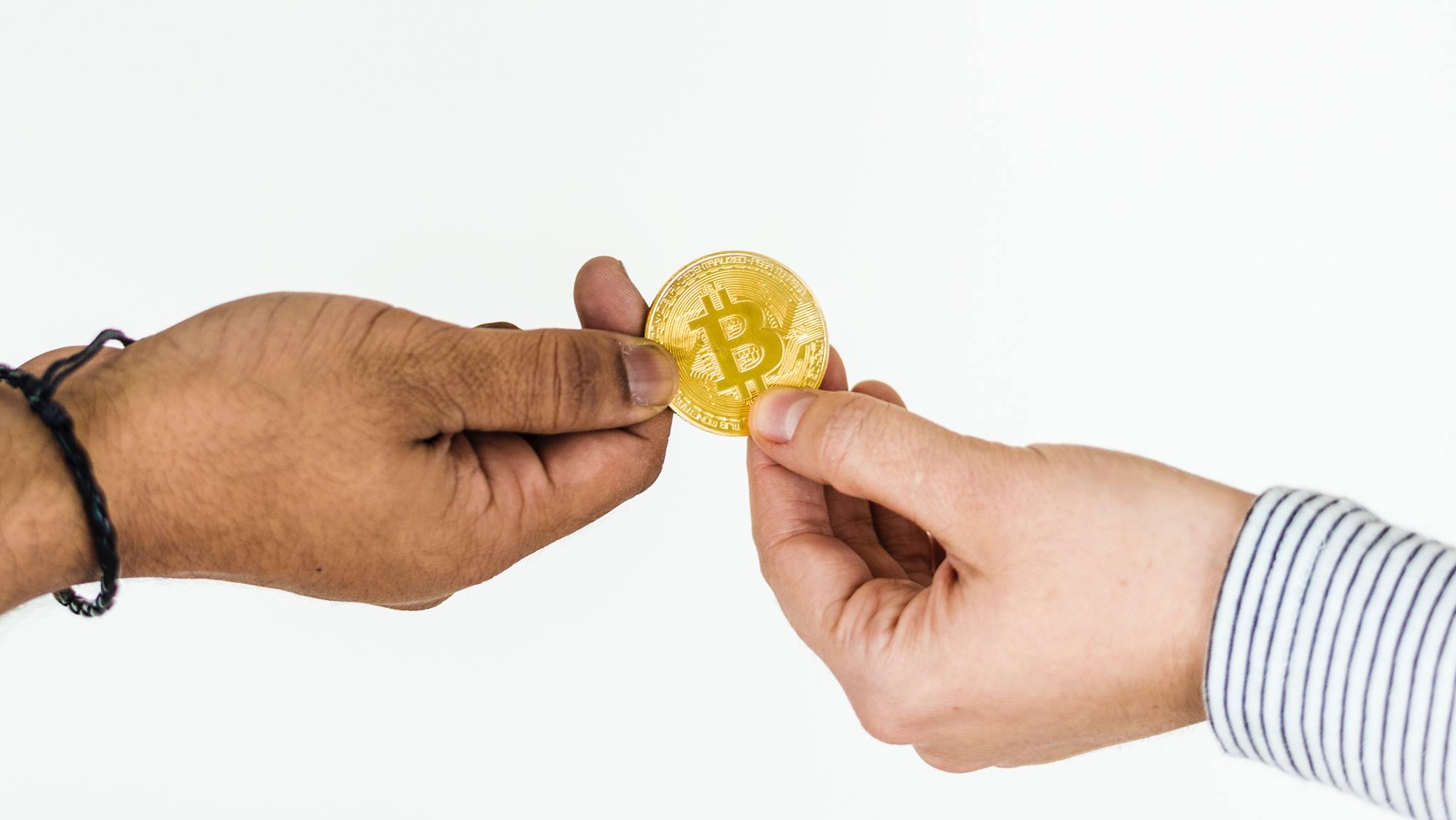
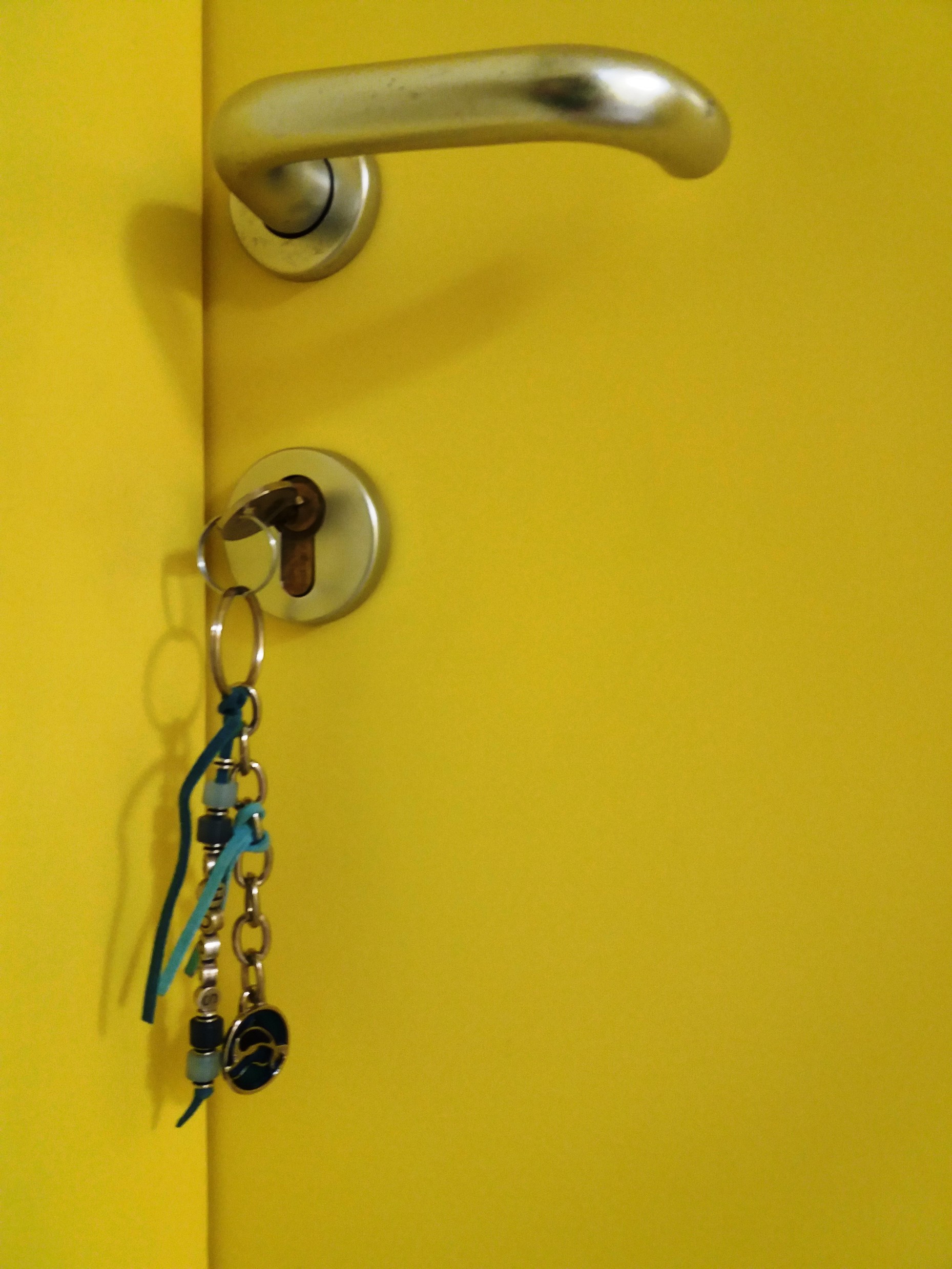

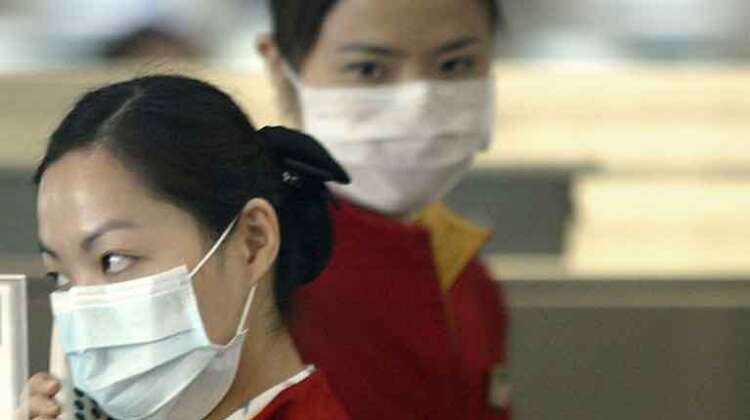
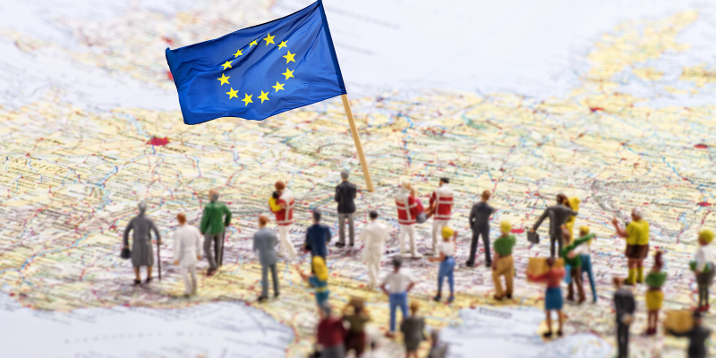
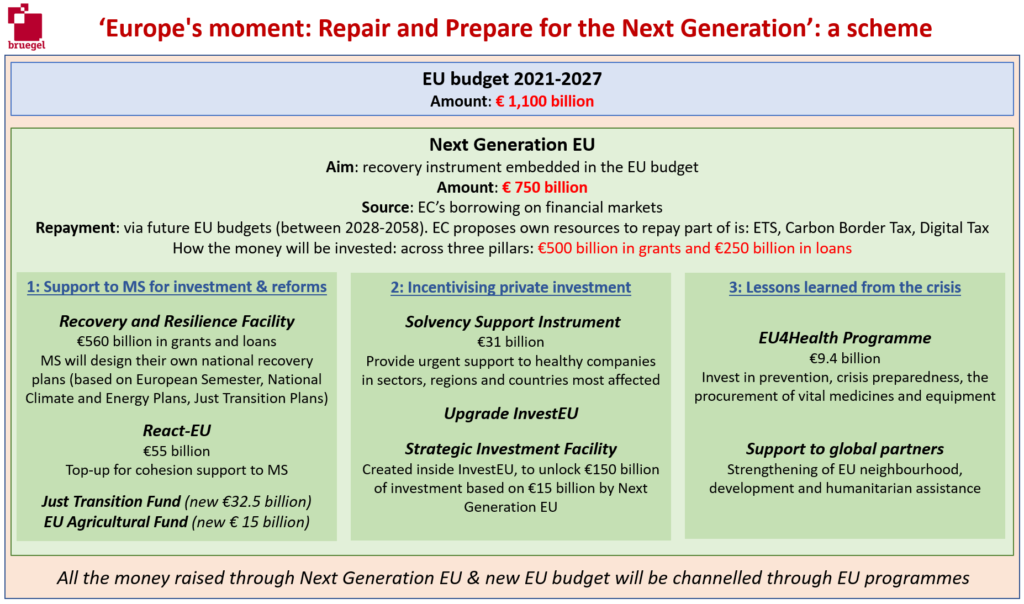
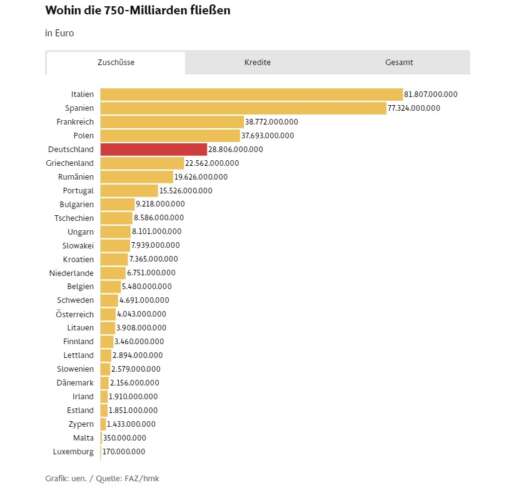
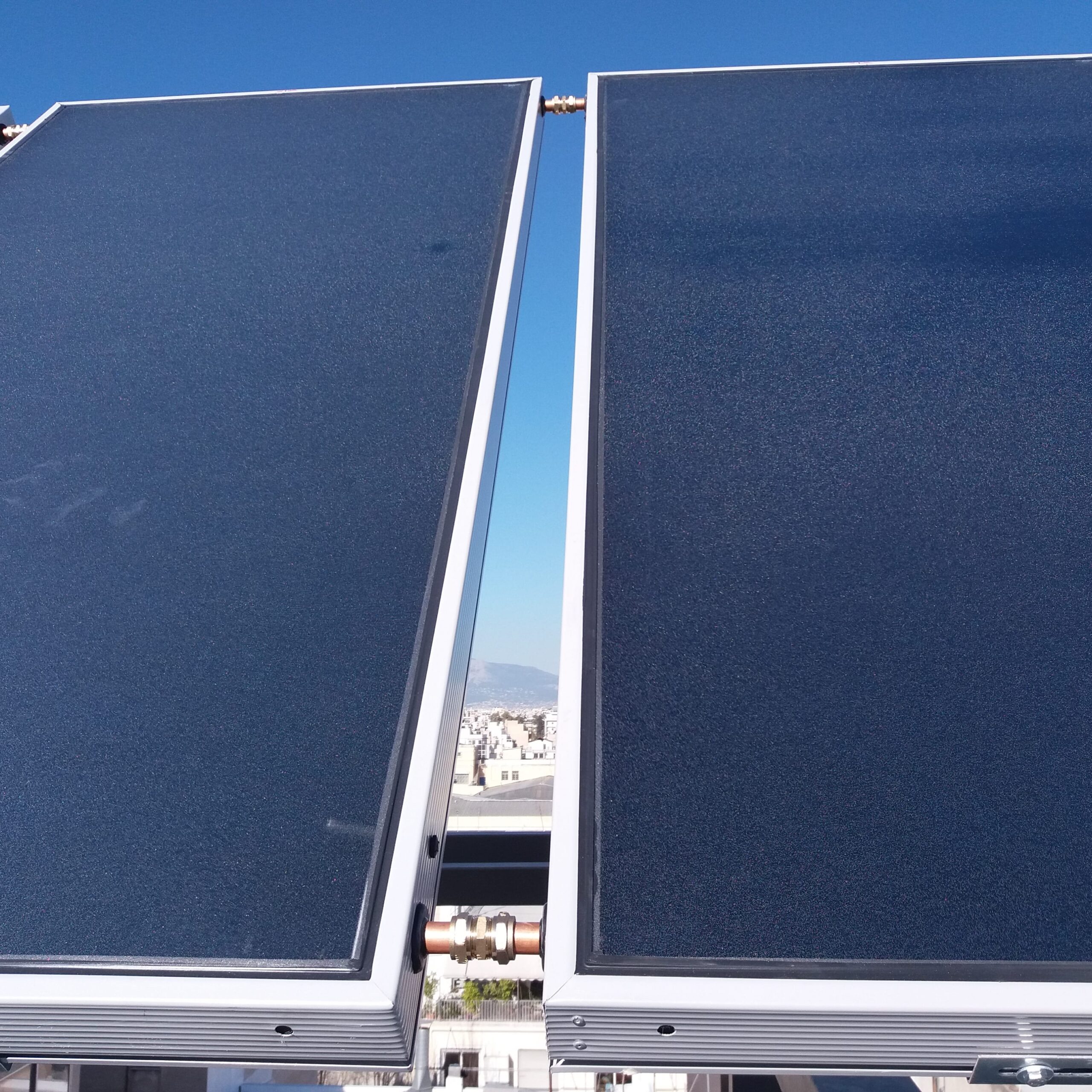
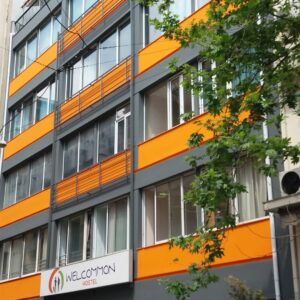 Wind of Renewal is renting since August 2016 the building with about 3.200 square meter, which was until the end of the year 2013 a public clinic. We fully renovated the building already twice. Once at autumn 2016 to be for 1,5 years a model center for accommodation and integration of the most vulnerable refugees and then again to become an innovative, functional and esthetic Hostel with a social impact, the
Wind of Renewal is renting since August 2016 the building with about 3.200 square meter, which was until the end of the year 2013 a public clinic. We fully renovated the building already twice. Once at autumn 2016 to be for 1,5 years a model center for accommodation and integration of the most vulnerable refugees and then again to become an innovative, functional and esthetic Hostel with a social impact, the 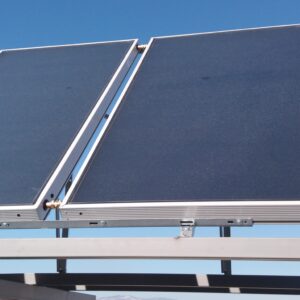
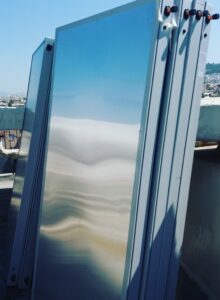 For environmental and economic reasons we are immediately looking to modify the building to a zero emission building and to operate as a center of education and training in green trades and activities and also as a place to demonstrate energy efficient technology and present renewable energy sources in the city of Athens.
For environmental and economic reasons we are immediately looking to modify the building to a zero emission building and to operate as a center of education and training in green trades and activities and also as a place to demonstrate energy efficient technology and present renewable energy sources in the city of Athens. 

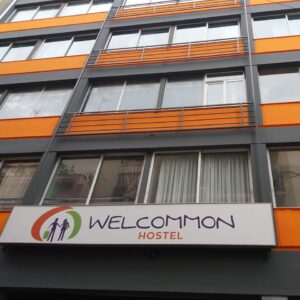 WELCOMMON HOSTEL is an innovative hostel with social impact as well as a center of social and green innovation, intercultural dialogue and socializing.
WELCOMMON HOSTEL is an innovative hostel with social impact as well as a center of social and green innovation, intercultural dialogue and socializing. 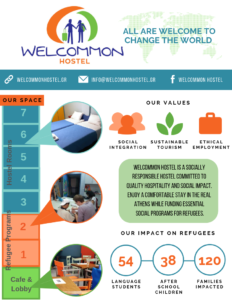 Until the
Until the 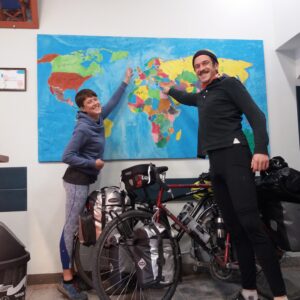 The visitors can discover the creative side of Athens. We “promote” our WELCOMMON HOSTEL to
The visitors can discover the creative side of Athens. We “promote” our WELCOMMON HOSTEL to 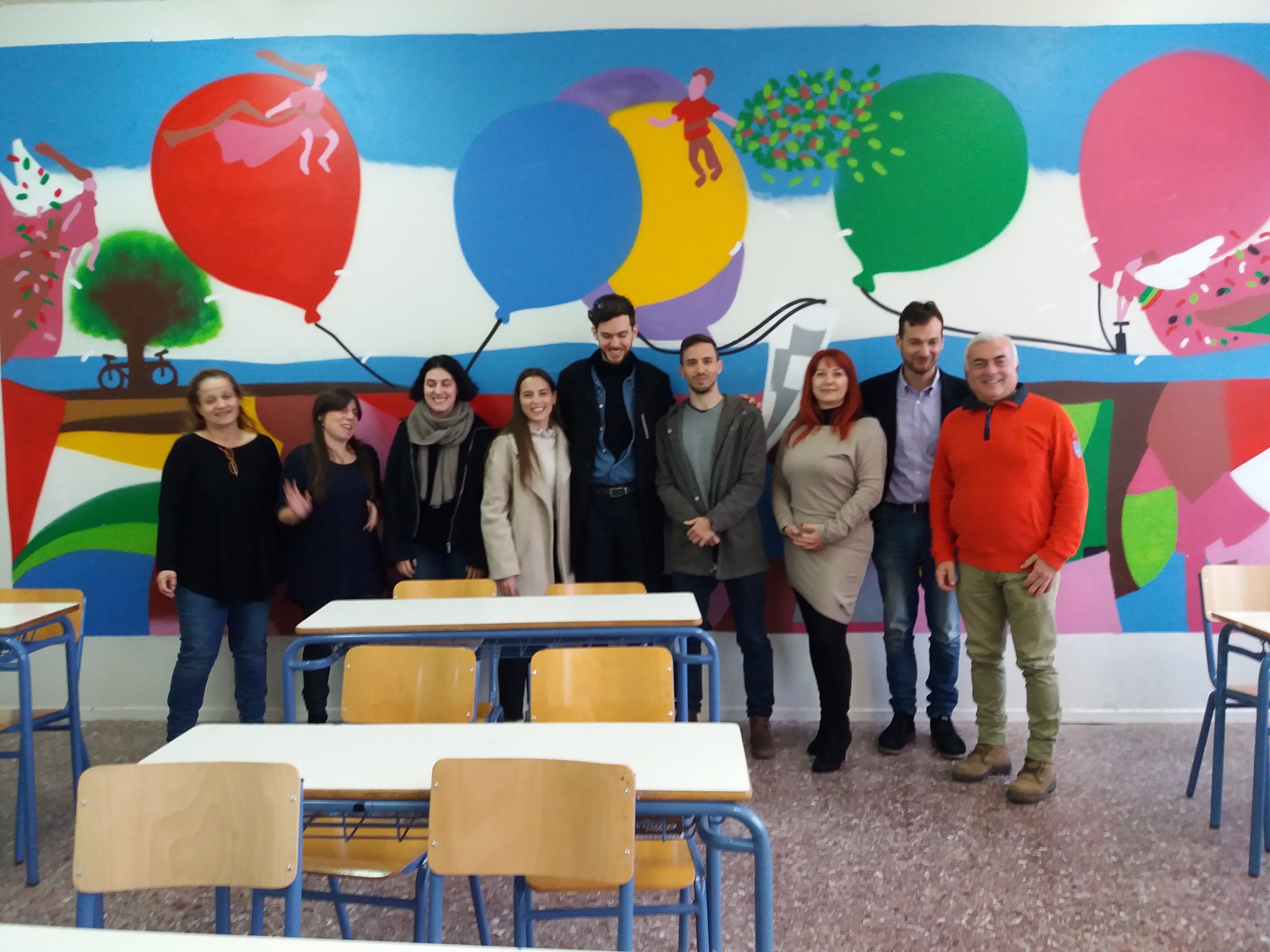
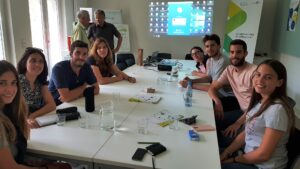 The Greek teams got in contact with different municipalities and schools in the region of Attica. They are collaborating with the local communities of Ag. Dimitrios, Vrilissia and Kaisariani as well as with the school community for making energy audits for 11 schools in total, too. The two previous Greek teams have already realized energy audits in 8 schools together with pupils and discussed the results with teachers and pupils. All the teams organise training seminars in schools and participate in meetings with mayors, technical department of the municipalities and local actors to discuss the implementation of
The Greek teams got in contact with different municipalities and schools in the region of Attica. They are collaborating with the local communities of Ag. Dimitrios, Vrilissia and Kaisariani as well as with the school community for making energy audits for 11 schools in total, too. The two previous Greek teams have already realized energy audits in 8 schools together with pupils and discussed the results with teachers and pupils. All the teams organise training seminars in schools and participate in meetings with mayors, technical department of the municipalities and local actors to discuss the implementation of 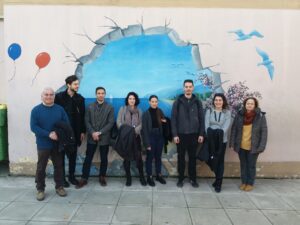 Each of the first two teams were visiting the schools regularly. They realized that the educators and the students were very enthusiastic with the educational part of the project and the methodologies of doing the audits all together. They even implemented non formal education tools to come closer with the students and to work together, based on the outcomes of the
Each of the first two teams were visiting the schools regularly. They realized that the educators and the students were very enthusiastic with the educational part of the project and the methodologies of doing the audits all together. They even implemented non formal education tools to come closer with the students and to work together, based on the outcomes of the 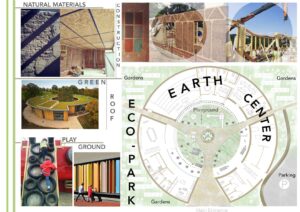 Due to coronavirus lockdown measures, the project work is now taking place online only.
Due to coronavirus lockdown measures, the project work is now taking place online only.  On European level we would like to see programs which qualify young Europeans on a large scale, refugees included, for the upcoming tasks of a climate-friendly energy transition and a green economy. This is in particular urgent and necessary in regions, suffering already in the past by high rates of
On European level we would like to see programs which qualify young Europeans on a large scale, refugees included, for the upcoming tasks of a climate-friendly energy transition and a green economy. This is in particular urgent and necessary in regions, suffering already in the past by high rates of 

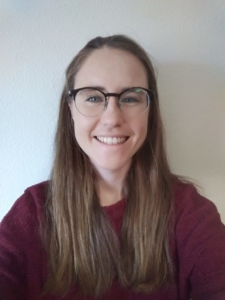
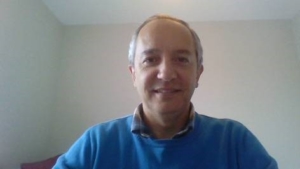
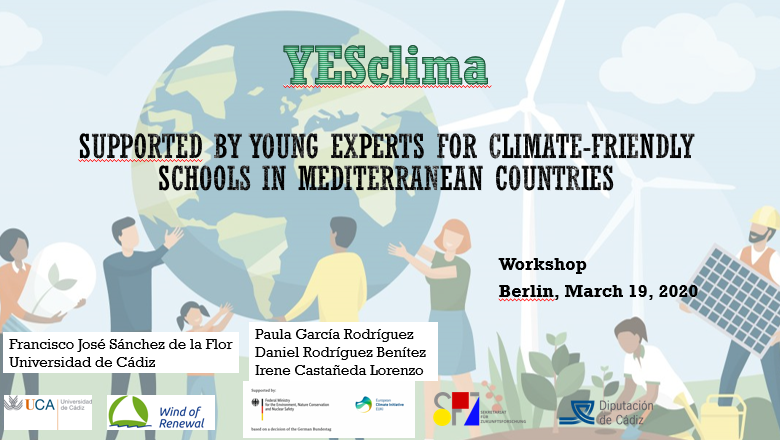

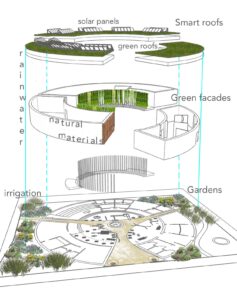 One of the main goal of this project is also to create a nearly Zero Energy Building. In order to do that we have implemented a number of systems and methods that can contribute to the energy audits of the building. The systems we propose are:
One of the main goal of this project is also to create a nearly Zero Energy Building. In order to do that we have implemented a number of systems and methods that can contribute to the energy audits of the building. The systems we propose are:
Recent Comments